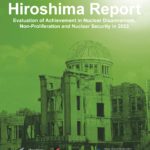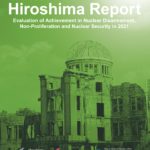4. The United Kingdom ■Nuclear-Weapon State
| Nuclear Disarmament | 19 Points | Full Points 101 | 18.8% |
| Change compared to the Hiroshima Report 2021:-8 | |||
| The U.K. announced its nuclear policies to increase the limit on the number of an overall nuclear weapons stockpile it possesses to no more than 260. It also declared to extend deliberate ambiguity, including the number of nuclear weapons it possesses, and to impose certain restrictions on transparency. Meanwhile, the U.K. maintained to construct a new class of four SSBNs, as replacement for the existing Vanguard-class vessels. However, the delay of the construction due to technical problems and the cost overruns are pointed out. It has not signed the TPNW. Meanwhile, the U.K. has engaged in joint work to develop nuclear disarmament verification measures with the U.S. and Norway, respectively, and participates in the IPNDV. NWS. It voted in favor of the UNGA resolution on nuclear disarmament proposed by Japan. | |||
| Nuclear Non-Proliferation | 40 Points | Full Points 47 | 85.1% |
| Change compared to the Hiroshima Report 2021:+1 | |||
| The U.K. acceded to the IAEA Additional Protocol with the provision for complementary access visits. All of its civilian nuclear material is subject to the international safeguards. It has proactively engaged in nuclear non-proliferation, including implementation of export controls. It submitted a report based on the Guidelines for the Management of Plutonium to the IAEA. | |||
| Nuclear Security | 27 Points | Full Points 41 | 65.9% |
| Change compared to the Hiroshima Report 2021:+1 | |||
| The U.K. has ratified all conventions relevant to nuclear security and has introduced recommended measures of INFCIRC/225/Rev.5. The U.K. is also involved in efforts to strengthen international nuclear security, including nuclear forensics and GICNT. In 2021, the U.K. announced as the president of G7 that the group will place high priority in HEU minimization. | |||






